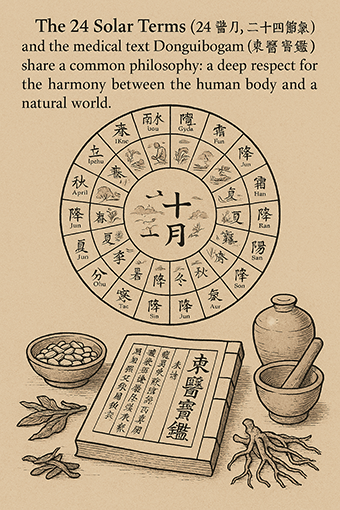The 24 Solar Terms (24 절기, 二十四節氣) and the medical text Donguibogam (동의보감, 東醫寶鑑) share a common philosophy: a deep respect for the harmony between the human body and the natural world. Donguibogam provides prescriptions and health management methods to prevent and treat illnesses that are likely to occur during specific solar terms.

What are the 24 Solar Terms?
The 24 Solar Terms are a system that divides the year into 24 periods based on the sun’s position. It was historically used in agricultural societies to predict seasonal changes and climate. It was created to compensate for the shortcomings of the lunar calendar, which is based on the moon’s phases. Major terms include Lichun (the Start of Spring), Chunfen (the Spring Equinox), Xiazhi (the Summer Solstice), Liqiu (the Start of Autumn), Qiufen (the Autumn Equinox), and Dongzhi (the Winter Solstice). Each term represents changes in temperature, precipitation, and humidity, all of which are deeply connected to physiological changes in the human body.
Donguibogam and Seasonal Health Management
Donguibogam emphasizes Sengseopbeop (섭생법, 攝生法), or health preservation methods, that are tailored to each season and solar term. It advocates for the body to adapt to natural changes, promoting the concept of Mibyeong (미병, 未病), which is preventing illness before it even starts.
- Spring (Lichun to Guyu): As nature revitalizes, the body’s circulation of Qi (氣) and blood becomes more active. This is the time to expel toxins accumulated over the winter and boost the energy of the liver.
- Recommended foods: Spring vegetables like Korean wild chives, naengi, and mugwort. They help improve blood circulation, strengthen the immune system, and assist with liver detoxification. 🌿
- Health tips: Light exercise and sufficient sleep help relax the body, and it’s important to maintain emotional stability.
- Summer (Lixia to Dashu): The heat and humidity can easily deplete the body’s energy. The heart’s function becomes stronger, while the kidney’s function can weaken.
- Recommended foods: Hydrating, cooling foods like cucumbers, watermelons, and Korean melons. They are effective for quenching thirst and lowering body heat. 🍉
- Health tips: Avoid excessive consumption of cold foods and drinks. Stay hydrated and get plenty of rest to replenish your energy.
- Autumn (Liqiu to Shuangjiang): The dominant dry energy can weaken the function of the lungs. This can lead to dry skin, coughing, and colds.
- Recommended foods: Pears, bellflower root, balloon flower root, and lotus root, which protect the lungs and bronchial tubes. 🍂
- Health tips: Autumn is a time to store up Yang energy, so keep your body warm and eat nutritious foods to prepare for the coming winter.
- Winter (Lidong to Dahan): The strong cold requires strengthening the energy of the kidneys. It’s crucial to keep your body warm and store energy to withstand the cold.
- Recommended foods: Nuts like pine nuts, walnuts, and chestnuts, and black-colored foods like black rice and black beans. These help strengthen kidney function. 🌰
- Health tips: Keep your body warm with hot teas and foods, and improve blood circulation with foot baths.